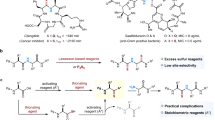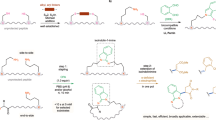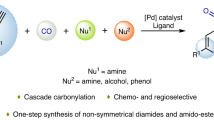Abstract
RECENT interest in the synthesis of polypeptides has centred around the ability of oxazolid-2 : 5-dione and its 3- and 4-substituted derivatives to polymerize with loss of carbon dioxide or to condense with amino-acids or their esters. Cook and Levy1 have now shown that the analogous 2-thiothiazolid-5-one and its 4-methyl derivative may also be used for the introduction of glycyl or alanyl residues. Attempts by Cook, Heilbron and Hunter2 to obtain the structural cross of the above heterocycles, that is, thiazolid-2 : 5-dione (III), were unsuccessful. These authors were interested in the latter compound and its derivatives, as they considered they would be of a stability intermediate between that of oxazolid-2 : 5-dione and 2-thiothiazolid-5-one and would consequently be more easily handled. The parent compound has now, unexpectedly, been obtained in good yield by the accompanying reaction scheme.
This is a preview of subscription content, access via your institution
Access options
Subscribe to this journal
Receive 51 print issues and online access
$199.00 per year
only $3.90 per issue
Buy this article
- Purchase on Springer Link
- Instant access to full article PDF
Prices may be subject to local taxes which are calculated during checkout
Similar content being viewed by others
References
J. Chem. Soc., 646 (1950).
J. Chem. Soc., 1443 (1949).
J. Chem. Soc., 1056 (1948).
Author information
Authors and Affiliations
Rights and permissions
About this article
Cite this article
AUBERT, P., KNOTT, E. Synthesis of Thiazolid-2:5-Dione. Nature 166, 1039–1040 (1950). https://doi.org/10.1038/1661039b0
Issue Date:
DOI: https://doi.org/10.1038/1661039b0
Comments
By submitting a comment you agree to abide by our Terms and Community Guidelines. If you find something abusive or that does not comply with our terms or guidelines please flag it as inappropriate.



